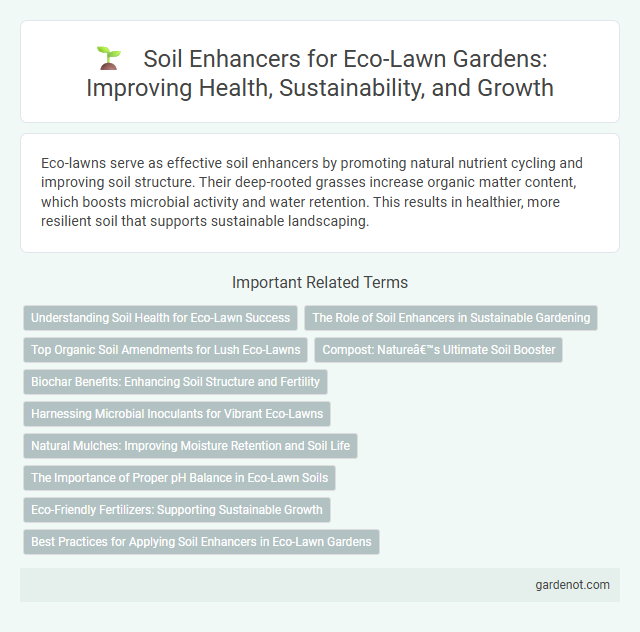Eco-lawns serve as effective soil enhancers by promoting natural nutrient cycling and improving soil structure. Their deep-rooted grasses increase organic matter content, which boosts microbial activity and water retention. This results in healthier, more resilient soil that supports sustainable landscaping.
Understanding Soil Health for Eco-Lawn Success
Soil health plays a crucial role in the success of an eco-lawn, with factors like nutrient content, pH balance, and microbial activity directly impacting grass growth and resilience. Effective soil enhancers improve organic matter, promote beneficial microorganisms, and optimize moisture retention to create an ideal environment for eco-lawn species. Regular soil testing and targeted amendments ensure sustainable soil fertility and long-term eco-lawn vitality.
The Role of Soil Enhancers in Sustainable Gardening
Soil enhancers play a critical role in sustainable gardening by improving soil structure, increasing nutrient availability, and promoting beneficial microbial activity, which supports healthier eco-lawns. These products, such as organic compost, biochar, and humic acid, help retain moisture and reduce the need for chemical fertilizers. Their use contributes to eco-friendly lawn management by fostering resilient plant growth and minimizing environmental impact.
Top Organic Soil Amendments for Lush Eco-Lawns
Top organic soil amendments like compost, worm castings, and aged manure significantly enhance soil fertility and structure, promoting robust root growth for lush eco-lawns. These natural soil enhancers improve moisture retention, increase microbial activity, and boost nutrient availability, creating an ideal environment for eco-friendly turf. Incorporating organic matter such as biochar and seaweed extract further enriches soil biology, ensuring a vibrant, sustainable lawn with reduced chemical inputs.
Compost: Nature’s Ultimate Soil Booster
Compost serves as nature's ultimate soil booster by enriching soil with essential nutrients like nitrogen, phosphorus, and potassium, which are vital for healthy eco-lawn growth. Its organic matter improves soil structure, enhances moisture retention, and promotes beneficial microbial activity crucial for sustainable lawn health. Incorporating compost reduces the need for chemical fertilizers, supporting an eco-friendly lawn care approach that fosters vibrant, resilient turf.
Biochar Benefits: Enhancing Soil Structure and Fertility
Biochar improves soil structure by increasing porosity and water retention, which enhances root growth and reduces erosion in eco-lawns. Its high carbon content supports beneficial microbial activity, leading to improved nutrient cycling and long-term soil fertility. Incorporating biochar into soil acts as a natural conditioner, boosting soil health and sustainability for eco-friendly lawn care.
Harnessing Microbial Inoculants for Vibrant Eco-Lawns
Harnessing microbial inoculants enhances soil health by increasing nutrient availability and improving soil structure, critical for vibrant eco-lawns. Beneficial microbes such as nitrogen-fixing bacteria and mycorrhizal fungi establish symbiotic relationships with grass roots, promoting robust growth and drought resistance. Advanced microbial formulations accelerate organic matter decomposition, boosting soil fertility and sustaining long-term eco-lawn vitality.
Natural Mulches: Improving Moisture Retention and Soil Life
Natural mulches such as shredded bark and leaf litter significantly improve soil moisture retention by reducing evaporation and maintaining consistent hydration levels for eco-lawns. These organic materials also enhance soil life by providing habitat and food for beneficial microorganisms, earthworms, and insects that contribute to healthier root development. Integrating natural mulches supports sustainable lawn care by promoting nutrient cycling and reducing the need for synthetic soil enhancers.
The Importance of Proper pH Balance in Eco-Lawn Soils
Maintaining proper pH balance in eco-lawn soils is critical for optimizing nutrient availability and promoting healthy microbial activity, which supports robust grass growth and resilience. Soil pH directly affects the solubility of essential nutrients like nitrogen, phosphorus, and potassium, ensuring that eco-lawns thrive without excessive chemical inputs. Regular soil testing and tailored soil enhancer applications help achieve and sustain the ideal pH range of 6.0 to 7.0, which is optimal for most eco-lawn grass species.
Eco-Friendly Fertilizers: Supporting Sustainable Growth
Eco-friendly fertilizers used as soil enhancers in eco-lawns promote sustainable growth by improving soil health and reducing chemical runoff. These fertilizers release nutrients gradually, supporting beneficial microbial activity and enhancing soil structure without harming the environment. Utilizing organic materials such as compost, biochar, and natural minerals ensures long-term lawn vitality while minimizing ecological impact.
Best Practices for Applying Soil Enhancers in Eco-Lawn Gardens
Applying soil enhancers in eco-lawn gardens requires precise assessment of soil pH and nutrient levels to tailor amendments effectively. Incorporating organic matter such as compost improves soil structure, water retention, and microbial activity, promoting sustainable grass growth. Regularly aerating the soil before application maximizes enhancer absorption and supports the long-term health of eco-friendly lawns.
Soil enhancer Infographic

 gardenot.com
gardenot.com